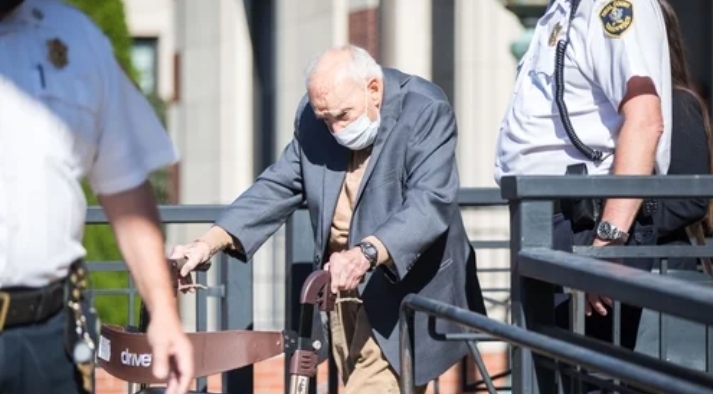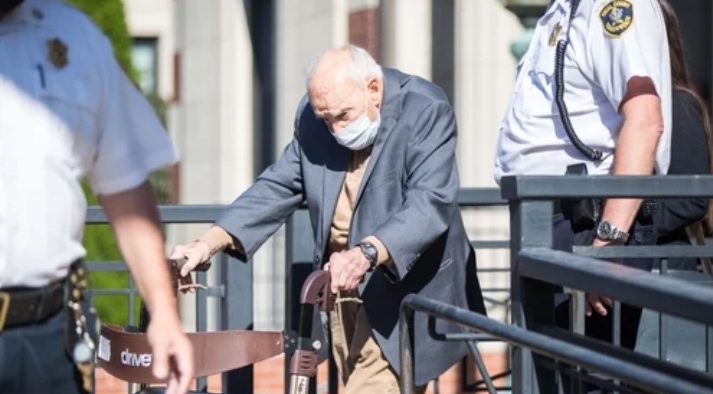CELEBRITY
Shocking News:Theodore McCarrick, Disgraced Former US Cardinal, Dies at 94…Read more.

Shocking News:Theodore McCarrick, Disgraced Former US Cardinal, Dies at 94…Read more.
Theodore Edgar McCarrick, once a towering figure in the Roman Catholic Church in the United States, passed away on April 3, 2025, at the age of 94 in Missouri. His death marks the end of a controversial life that saw him rise to the pinnacle of ecclesiastical power as a cardinal and Archbishop of Washington, only to fall into infamy following substantiated allegations of sexual abuse against minors and adults. McCarrick’s career, spanning over six decades, was marred by a scandal that shook the Catholic Church and prompted significant introspection within its ranks.
Early Life and Rise in the Church
Born on July 7, 1930, in New York City to an Irish-American family, McCarrick was the only child of Theodore E. McCarrick, a ship captain who died of tuberculosis when McCarrick was three, and Margaret T. McLaughlin, who worked in an auto parts factory to support the family. Raised in a modest household, McCarrick’s early inclination toward the priesthood was nurtured through his Catholic education and service as an altar boy. He was ordained a priest in 1958 for the Archdiocese of New York by Cardinal Francis Spellman, beginning a career that would see him ascend rapidly through the Church’s hierarchy.

McCarrick’s charisma, multilingual abilities, and knack for fundraising distinguished him early on. After serving as a personal secretary to Cardinal Terence Cooke, he was named an auxiliary bishop of New York in 1977. In 1981, he became the inaugural bishop of the newly established Diocese of Metuchen, New Jersey, and in 1986, he was appointed Archbishop of Newark. His tenure in these roles showcased his administrative prowess and his ability to connect with both the faithful and influential figures outside the Church.
In 2000, Pope John Paul II appointed McCarrick as Archbishop of Washington, D.C., a position that solidified his status as a power broker in both ecclesiastical and political circles. The following year, in 2001, he was elevated to the College of Cardinals, a rare honor that positioned him among the Church’s elite and made him eligible to participate in papal elections. McCarrick’s diplomatic efforts took him to conflict zones and brought him into contact with world leaders, including Fidel Castro, enhancing his reputation as a global emissary of the Vatican.
A Career Overshadowed by Allegations
Despite his accomplishments, whispers of misconduct followed McCarrick throughout his career. Reports of inappropriate behavior with seminarians and young priests surfaced as early as the 1980s, yet these were often dismissed or downplayed by Church officials. McCarrick’s charm and influence allowed him to navigate these rumors, maintaining his upward trajectory. In 1999, Cardinal John O’Connor of New York warned Vatican officials about allegations that McCarrick had invited seminarians to share his bed, but Pope John Paul II, swayed by McCarrick’s personal denial, proceeded with his appointment as Archbishop of Washington.
The turning point came in June 2018, when the Archdiocese of New York found credible evidence that McCarrick had sexually abused a teenage altar boy in the early 1970s. This revelation prompted the Holy See to suspend him from public ministry. Subsequent investigations uncovered a broader pattern of abuse, including sexual misconduct with adult seminarians and young priests over decades. James Grein, who claimed McCarrick abused him starting at age 11, became a prominent voice among the accusers, alleging that McCarrick had exploited his authority as a trusted family friend and priest.
In July 2018, Pope Francis accepted McCarrick’s resignation from the College of Cardinals, an unprecedented move marking the first such resignation since 1927. Ordered to a life of prayer and penance, McCarrick faced a canonical trial by the Vatican’s Congregation for the Doctrine of the Faith. In February 2019, he was found guilty of solicitation in the sacrament of confession and violations of the Sixth Commandment with minors and adults, aggravated by the abuse of power. Pope Francis confirmed his laicization, stripping McCarrick of his priestly status and reducing him to a layman—a historic fall for a cardinal.
The Vatican Report and Accountability
The McCarrick scandal prompted Pope Francis to commission a comprehensive investigation, resulting in a 449-page report released by the Vatican’s Secretariat of State in November 2020. The document detailed the institutional failures that allowed McCarrick’s rise despite known allegations. It placed significant blame on Pope John Paul II, who had appointed McCarrick to Washington despite warnings, believing his handwritten denial of sexual misconduct. The report also revealed that by 2000, the Vatican was aware of McCarrick’s behavior with seminarians, yet no decisive action was taken.
The investigation highlighted a culture of silence and denial within the Church, where reports of McCarrick’s actions were minimized as rumors or tolerated due to his fundraising prowess and connections. It interviewed 90 individuals, including victims, former seminarians, and Church officials, and drew on documents from Vatican departments and U.S. dioceses. While it provided clarity on what the Vatican knew and when, it stopped short of fully addressing the systemic “old boys’ club” culture that critics argue enabled McCarrick’s behavior.
Pope Francis, who was not implicated in overlooking earlier allegations, acted decisively once the minor abuse claim surfaced, ordering McCarrick’s removal from the College of Cardinals and his canonical trial. However, the report sparked broader demands for accountability and reform, with survivors and advocates arguing that the Church had yet to fully reckon with its handling of abuse cases.
Legal Challenges and Final Years
Beyond the Church’s internal reckoning, McCarrick faced criminal charges in the United States. In July 2021, he was charged in Massachusetts with three counts of indecent assault and battery on a person over 14, stemming from a 1974 incident at a wedding reception. He pleaded not guilty, but in August 2023, a judge dismissed the case, ruling McCarrick incompetent to stand trial due to advanced dementia. A similar case in Wisconsin, filed in April 2023, was suspended in January 2024 after a court-appointed psychologist confirmed his cognitive decline.
In his final years, McCarrick lived in seclusion at the Vianney Renewal Center in Dittmer, Missouri, a facility for priests operated by the Servants of the Paraclete. Diagnosed with dementia, he faded from public view, his once-vibrant career reduced to a cautionary tale. His death on April 3, 2025, was confirmed by Cardinal Robert McElroy, the current Archbishop of Washington, who expressed solidarity with McCarrick’s victims: “At this moment I am especially mindful of those who he harmed during the course of his priestly ministry. Through their enduring pain, may we remain steadfast in our prayers for them and for all victims of sexual abuse.”
Legacy and the Church’s Ongoing Crisis
McCarrick’s death closes a chapter in one of the most high-profile abuse scandals in the modern Catholic Church, but it does not resolve the broader crisis it exposed. As the highest-ranking U.S. cleric to face criminal charges and the first cardinal laicized for sexual misconduct, his case became a symbol of the Church’s struggle to address abuse within its ranks. The Survivors Network of those Abused by Priests (SNAP) lamented that McCarrick “never stood trial for the vast harm he inflicted,” underscoring the frustration of victims who sought justice beyond his defrocking.
The scandal eroded trust in the Church, revealing how power, prestige, and a culture of clerical protectionism allowed McCarrick to thrive despite decades of allegations. His connections to three popes—John Paul II, Benedict XVI, and Francis—and his participation in the 2005 conclave that elected Benedict XVI underscored the depth of his influence. Yet, his fall also prompted reforms, including stricter Vatican protocols for handling abuse allegations and increased transparency, though critics argue these measures remain insufficient.
McCarrick’s legacy is a complex one: a gifted leader whose contributions to the Church were overshadowed by heinous acts and institutional failures. His death at 94, on April 3, 2025, serves as a somber reminder of the human cost of those failures and the ongoing challenge for the Catholic Church to restore credibility and ensure accountability. As the Church moves forward, the voices of survivors like James Grein and organizations like SNAP continue to demand that the lessons of McCarrick’s case lead to lasting change, ensuring that such a betrayal of trust is never repeated.












